This list will give you an overview of all Xiaomi Mi Air Purifiers that have been so far. This comparison covers older models such as the Mi Air Purifier 1, 2 and 2H, 2C, 2S, and the newer 3, 3H, and 3C. I will be covering what each model overs, and how they compare to the alternatives. As Xiaomi Mi Air Purifiers can be difficult to identify, unique characteristics will also be listed.

Late last year, I finally took the decision to buy myself an air purifier. The model I went with was the Mi Air Purifier 3H, and it is sitting next to me, whirring away, as I type out these very words. As an asthmatic, staying indoors for a prolonged period of time has had a detrimental effect on my lungs. I decided that enough was enough and set out to clean up the air I am breathing in on a daily (and nightly) basis, thanks to an air purifier.
- Performance: The Mi 3C achieves 11301 ft³/h PM CADR while moving 5330 litres of purified air per minute.
- Screen: A large display shows real-time PM2.5 values and is colour coded for easy viewing even from across the room.
- Silent: The quietest air purifier from Xiaomi.
As I was researching the numerous models Xiaomi has on offer, I couldn't find any decent comparisons of the different models. Even figuring out that the letter H in 3H and 2H meant that it came with a HEPA filter preinstalled took far too long to figure out. Having a simple table listing all the specifications would have greatly accelerated my decision-making. In the end, I had to create one myself, which wasn't the easiest thing I have ever done. You will find out why that is, as you read this article.
As I already had my table in place, I'm excited to announce that there now is a full comparison to be found online, and you're looking at it now. Now that the US no longer banns Xiaomi products, many of the Mi Air Purifier models can be found online, for example on Amazon.
The Xiaomi Mi Air Purifier series
The most known series of air purifiers made by Xiaomi are those that carry the Mi Air Purifier branding. I won't be including the Pro models, as they will be the subject of another article. I will also not be including the Viomi and Smartmi models, but they may be added later (let me know in a comment if you want this to happen immediately).
Five Xiaomi Mi Air Purifiers have been released so far. Of these, the Mi Air Purifier 1 has become almost impossible to track down, and the series 2 models are also becoming ever harder to find, too.
- Xiaomi Mi Air Purifier 1
- Xiaomi Mi Air Purifier 2 and 2H
- Xiaomi Mi Air Purifier 2S
- Xiaomi Mi Air Purifier 2C
- Xiaomi Mi Air Purifier 3 and 3H
- Xiaomi Mi Air Purifier 3C
The Mi Air Purifier 3 and 3H are the same device. The H indicates that it ships with a HEPA filter preinstalled, instead of a more basic EPA filter. The same applies to the Mi Air Purifier 2 and 2H. However, the Pro and Pro H are different devices, so don't get them mixed up. Why Xiaomi chooses to name their devices in this manner I do not know, and things are about to get even more complicated.
Two Mi Air Purifiers that aren't identical are the 3/3H and 3C. The Mi Air Purifier 3C is a slightly modified version of the 3/3H and has slightly different specs. It is slightly quieter, but also less powerful. The Mi Air Purifier 2C is a slightly beefed up version of the 2/2H, and the 2S has the same specs as the 2/2H but has an added screen.
How to identify a Xiaomi Mi Air Purifier
Before getting in to the comparison, you might want to know how to identify each Xiaomi Mi Air Purifier model. This can be useful because depending on where you are buying it from, the listing might not be complete, or you might want to confirm whether what you received is precisely what you ordered.
In the following paragraphs, I will only be describing external differences of the devices and not go too deep into the specs. The most relevant numbers and features will be listed in the comparison table further down.
| Model | Screen | Button placement | Filter access |
|---|---|---|---|
| Xiaomi Mi Air Purifier 1 | No | Top | |
| Xiaomi Mi Air Purifier 2/2H | No | Top | Back side |
| Xiaomi Mi Air Purifier 2S | Yes | Top | Top |
| Xiaomi Mi Air Purifier 3/3H | Yes | Screen | Back side |
| Xiaomi Mi Air Purifier 3C | Yes | 2×Top | Top |
Xiaomi Mi Air Purifier 1: Larger than the rest
The Xiaomi Mi Air Purifier 1 is an outlier in the Xiaomi Mi Air Purifier series and is technically more comparable to the Pro models. Still, I'm including it in this list as its name suggests I should. The Xiaomi Mi Air Purifier 1 is a whopping 60% larger in volume compared to its successors, but shares many of their design elements.
It's not like you would need any more details to be able to recognize it, but another unique thing about the Xiaomi Mi Air Purifier 1 is the mi logo on the front panel.
The Mi Air Purifier 1 does not include a screen and features a single push button next to the air exhaust with which you can select its speed.
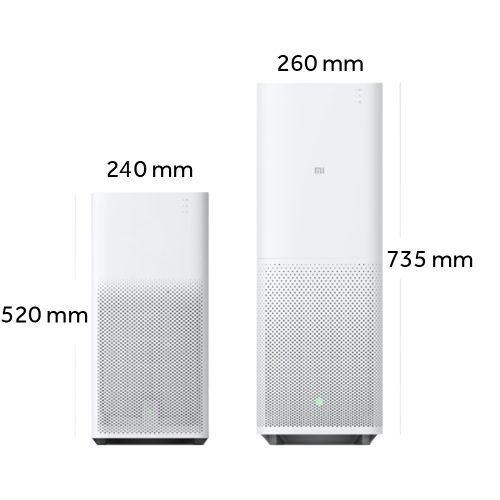
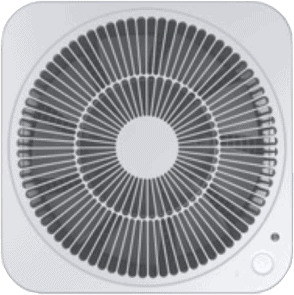
Xiaomi Mi Air Purifier 2/2H: The new standard
With the Mi Air Purifier 2/2H, Xiaomi shrunk the non-perforated top part of the Mi Air Purifier 1 down to around half its size. The Mi Air Purifier 2/2H is smaller, lighter, and less powerful than its predecessor, but it did set the blueprint for all future models.
It is much more efficient than the first generation, with Xiaomi claiming it will only use 58% power of what its predecessor did. I wasn't able to figure out whether that statistic was at the same volume of air output, or if it was just marketing talk.
When set to night-mode, the Mi Air Purifier 2/2H produces only 30 dB of noise (comparable to someone whispering), which is 11% quieter than the first generation.
How to identify the Xiaomi Mi Air Purifier 2/2H and 2C
The difference between the Mi Air Purifier 2 and 2C lies in their respective construction. The perforated area on the Mi Air Purifier 2 purifier extends slightly further up and there are no visible breaks or borders to it. On the Mi Air Purifier 2, A door on its back side can be opened to change the filter. By comparison, on the Mi Air Purifier 2C, you remove the top is part to change the filter.
The dimension of both the 2/2H and 2C are identical at 24 cm * 24 cm * 52 cm and both are controlled using a single push button next to the air exhaust.
On the inside, the Mi Air Purifier 2C is slightly more powerful than the 2/2H and 2S. And both the Mi Air Purifier 2/2H and 2C are easily distinguishable from all other models: They don't feature a screen.
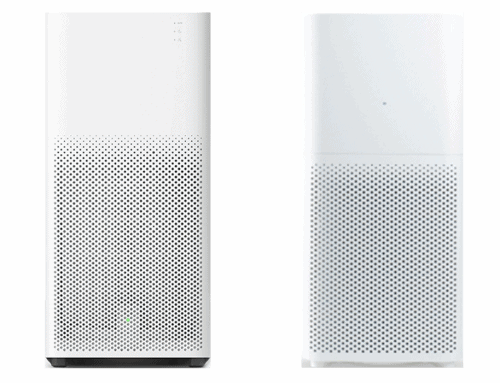
Xiaomi Mi Air Purifier 2S: Introducing the screen
With the Xiaomi Mi Air Purifier 2S, what is now a mainstay of the series, was first introduced: The round screen. I'm assuming that is what the S in the name stands for. Spec wise, the 2S and the 2/2H are identical. The Mi Air Purifier 2S' screen additionally has a feature which was sadly removed in the succeeding generation: It can auto-adjust its brightness depending on the ambient light.
- The first Air Purifier from Xiaomi to have a screen.
- Otherwise identical to the Xiaomi Air Purifier 2 and 2H.
The Mi Air Purifier 2S and the 3/3H share some similarities, such as the identical dimensions, but once you know what to look out for, you will easily be able to differentiate them.
Other than the succeeding models, the Mi Air Purifier 2S keeps the control button it inherited from its siblings: A single push button next to the exhaust. On the 3/3H the exhaust extends to the edges of the top panel as the button was removed and integrated in to the display. Additionally, the air quality is highlighted using a bar on the 2S and on the 3/3H it is a circle.
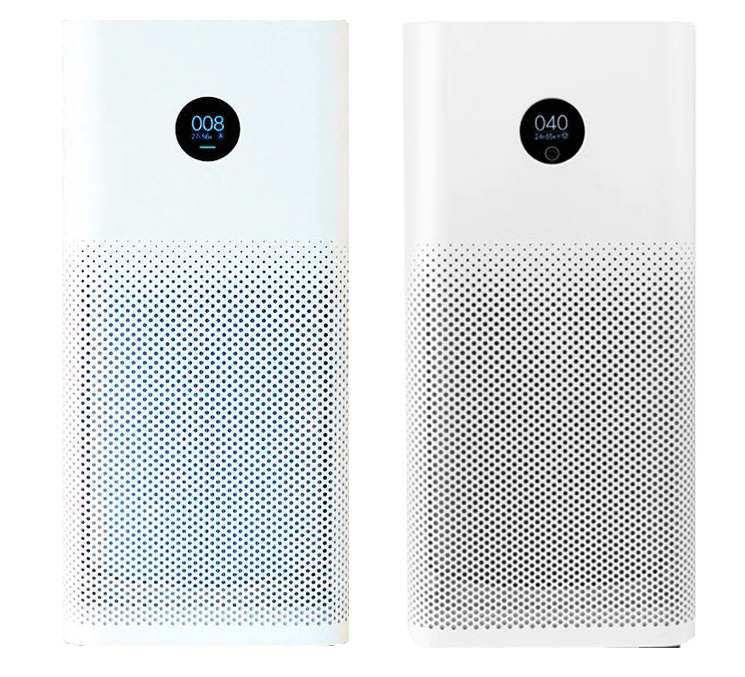
Xiaomi Mi Air Purifier 3/3H/3C: Same size, more power
The 3 series models are the newest additions to the Xiaomi Mi Air Purifier family. With this generation, the Mi Air Purifier 3 and 3H are once again identical in specs, but feature a different preinstalled filter. The H in 3H stands for HEPA, and thus it will come with a higher quality filter than the non-H version.
Xiaomi Mi Air Purifier 3H
- Comes with an HEPA filter in the box.
- Otherwise, identical to the Mi Air Purifier 3.
As with the 2/2H and 2C, the main outer differentiator between the Mi Air Purifier 3/3H and the 3C is the chamber design. The panels on the 3/3H stretch from the bottom of the air purifier to the top. The Mi Air Purifier 3C features a two-chamber design. The filter in the 3/3H can be changed using a door on the backside, while the top part of the 3C can be removed to gain access.
Apart from that, the screen on the 3C is slightly different to the one found on the 3/3H. Instead of an OLED panel, it uses a grid of LEDs to display the air quality in numerals, and a coloured bar helps you understand what those numbers mean.
Unfortunately, all models have done away with the automatic brightness adjustment of the display. Instead, you will have to make manual adjustments using the app or the button located on the back of the device.

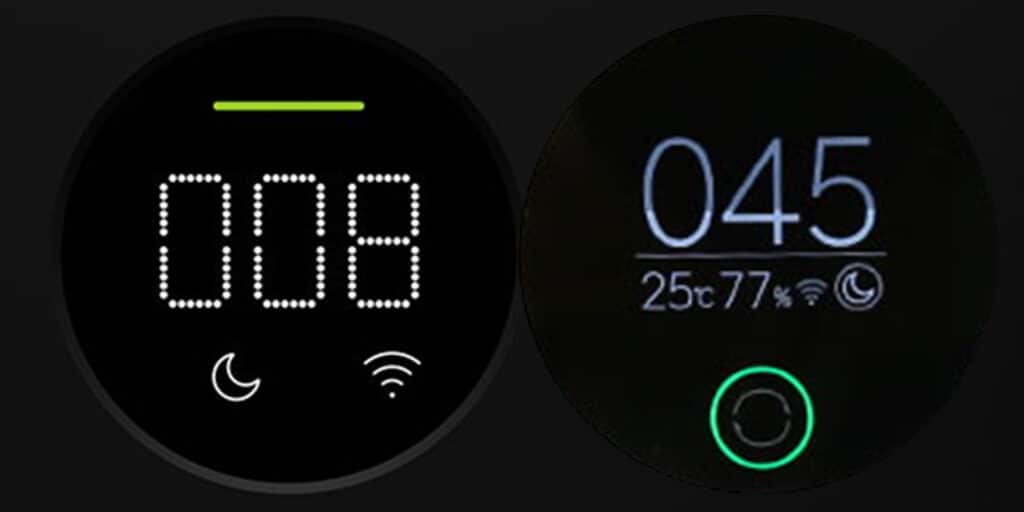
About the Xiaomi Mi Air Purifier filters
I have mentioned the filters of these devices numerous times but not yet explained that all of them, except for the Mi Air Purifier 1, use the same size filter. Were you to buy a non-H Mi Air Purifier, you could easily upgrade to a HEPA filter, and you also don't have to worry about an older device no longer being supported.
| Property | Blue | Purple | Green | Grey |
|---|---|---|---|---|
| First layer | Primary filter for large particles | |||
| Second layer | EPA filter (less efficient than HEPA) |
Antibacterial layer | H11-grade HEPA filter | H13-grade True HEPA filter |
| Third layer | Activated carbon filter | High efficiency filter material | Activated carbon filter | Activated carbon filter |
| Fourth layer | Activated carbon filter | |||
| Target | Formaldehyde Benzene VOCs |
Formaldehyde Benzene VOCs |
||
| Compatibility | 2/2H, 2C, 2S, 3/3H, 3C | 2/2H, 2C, 2S, 3/3H, 3C | 2/2H, 2C, 2S, 3/3H, 3C | 2/2H, 2C, 2S, 3/3H, 3C |
| Price (Amazon) | No products found. | No products found. | $99.00 | $49.49 |
| Buy now | AliExpress | AliExpress | AliExpress | |
| No products found. | Buy on Amazon | Buy on Amazon | ||
On paper, the grey filter featuring an H13-grad True HEPA layer appears to beat the alternatives. However, there have been tests done that show how an H11-grade HEPA filter can actually deliver more clean air.
All Xiaomi Mi Air Purifiers compared
In the following tables you will see a full comparison of all the Xiaomi Mi Air Purifiers. Keep in mind, that every model shares the same dimensions (26 cm * 26 cm * 52 cm) and is compatible with the same filters.
Xiaomi Mi Air Purifier performance
CADR: The Clean Air Delivery Rate tells you how efficient the air purifier is at removing certain contaminants from the indoors. The three pollutants that are measured are pollen, smoke, and dust. While still broadly used, the CADR rating system has many weaknesses. Higher is better.
Room area: The area in which the air purifier can deliver clean airflow. Higher is better.
Noise level: The minimum noise level represents how quiet the device is in its sleep mode. The maximum noise level represents how loud the device is at full power.
Power: The power consumption of the device from sleep mode to full power. In sleep mode we can assume that no more than ~2 W are used on all Xiaomi Mi Air Purifier models.
PM Sensor: Laser sensor deliver more accurate readouts than those utilizing infrared. The laser sensors have a small fan to help provide airflow to the sensor. Infrared sensors use a heater element which provides a draft to the sensor. While it has fewer moving parts, the infrared sensor isn't as fast to react as the laser sensor.
| Model | CADR | Room area | Noise level | Power | PM Sensor | Buy |
|---|---|---|---|---|---|---|
| 3C | 320 m³/h | 38 m² | 31 - 61 dB | 29 W | High-precision laser | AliExpress |
| 3/3H | 380 m³/h | 44 m² | 32 - 64 dB | 1.5 - 38 W | High-precision laser | AliExpress |
| 2C | 350 m³/hr | 42 m² | 63 dB * | 33 W | Infrared | |
| 2S | 310 m³/h | 37 m² | 32 - 66 dB | 1.5 - 29 W | High-precision laser | AliExpress |
| 2/2H | 310 m³/h ** | 37 m² | 33.5 – 66 dB | 1.5 - 31 W | Infrared | AliExpress |
** 388 m³/h in active mode
Xiaomi Mi Air Purifier features
While Xiaomi calls it a touch display, the Mi Air Purifier 3/3H features a single capacitive button that sits underneath the same glass as the screen. You can't swipe through the different settings or adjust the fan's speed using a slider. You can only adjust the settings using the single capacitive button.
| Model | Fan | Control | Filter access |
|---|---|---|---|
| 3C | Unknown | Digital LED display Two push buttons | Top |
| 3/3H | Rear-tilting centrifugal fan | OLED "touch" screen display Button for brightness control | Back |
| 2C | Unknown | Single push button without display | Top |
| 2S | Eddy Mixture of axial and turbine blades | OLED display with automatic brightness adjustment Single push button. | Back |
| 2/2H | Eddy Mixture of axial and turbine blades | Single push button without display | Back |
Which Xiaomi Mi Air Purifier is the best?
Based on the specs, the Xiaomi Mi Air Purifier 3 and 3H has the best performance out of the lot. The 3C delivers a similar performance at a slightly lower noise level, but it also covers a smaller area. For most office and bedroom environments, the Xiaomi Air Purifier 3C will be the best choice.
Xiaomi Mi Air Purifier 3C
- Performance: The Mi 3C achieves 11301 ft³/h PM CADR while moving 5330 litres of purified air per minute.
- Screen: A large display shows real-time PM2.5 values and is colour coded for easy viewing even from across the room.
- Silent: The quietest air purifier from Xiaomi.
While the Xiaomi Mi Air Purifier 2/2H/2S can occasionally be found at a lower price point, they are louder and less powerful than their successor. The Xiaomi Mi Air Purifier 2C sits somewhere between the 3/3H and 3C and could be considered a decent alternative to both, when found for at a lesser price.
Things are never straight-forward with Xiaomi
What wasn't covered in this article were air purifiers from Xiaomi's various sub-brands and closely related vendors. The Viomi Air Purifier Pro is a large and powerful air purifier which also includes an insect trap. Mijia sells a desktop Air Purifier which also acts as a fan. The Smartmi Air Purifier is shaped like a tube and features gesture controls along with the "touch" screen found in the Xiaomi Air Purifier 3/3H. Finally, there's the Mijia Air Purifier F1 which has a similar design to the aforementioned 3/3H but is slightly more powerful.

Thanks..this helped a lot! Regards from Manila/Philippines..Ulf
That’s what I hoped for – If it can help me then surely it can help others 🎉
Amazing comparison , thank you very much.
Way too many options but this article is really helpful to gain some clarity.
You’re welcome. I was in the same situation when deciding which model to go with. As I had the comparison already made, I thought I could maybe save some else some time.
Thanks a lot for the article. I was only able to find the 2H/3H/PRO comparison on Xiaomi’s official page, but your article answered a lot of questions.
Cheers!
You’re welcome!
Thanks!!
Great article, thank you!
I still wonder what kind of fan type/blades 3C uses
You’re welcome! I just don’t think they’ve been around for long enough for someone to have disassembled one yet. I tried looking for replacement parts on AliExpress, which would have given us a good look at the fan, but it appears there’s nothing available yet.
so does it cleans the air ? feel thee difference ?
I can definitely say that the 3C makes a difference in my daily life. But that is mainly because I am asthmatic. I couldn’t tell you how well it fares in a polluted city.
does it help with your asthma?…
My feeling is that yes, it does.
Thank you for taking the time to do this. That was helpful.
The comparison is so detailed and amazing
Thank you for making this article.
You’re welcome!
Thank you so much for this comparison. This has helped me a lot ! 😄
You are welcome!
this is very helpful. Thanks alot
Thankyou so much,
Does the CADR difference make much effect difference?
Hello there. CADR is quite a flawed measurement, as can be seen here. As it doesn’t measure gas and small particles, it can actually be useless in many situations. For example, the small particles are important for me as I am an asthmatic.
a hundred thanks to you, this site really help me to choose which xiaomi air purifier should I buy
Thanks for the comparison. I have a question why I can’t find a way to get my Mi Air Purifier 3 connected to Google home/assistant? It’s only connected to Mi Home App so far
Hi there. Sorry, I haven’t got mine connected to Google Home. I might try it later and report back.
Hi, great comparative article. How many hours do those need to operate (vs. standby mode) for daily use of a upper limit sized room? How often on average do you have to change the filter? I understand these questions are vague, just an example would help 🙂 … cheers!
Hi there. The time you will need to run it depends very much on your environment. I use mine on auto ~90% of the time, and it runs slowly all day long. As for the second question, the filter will last you 6-9 months.
I’d just like to add my thanks to the list. It is a highly useful article, many thanks! 🙂
Thanks for the kind words 🙂
Thank you!
Truly appreciated your comparation it helped a lot.
Now they have a new version that was release on September Xiaomi Smart Air Purifier 4 Pro, but its release in EU will take long time.
No problem! Thanks for letting me know. I have also compared the Pro models here. These are quite a bit larger than the non-Pro models. I have seen that this model is on the Xiaomi Global site, so I’m assuming it is destined for internation release.
does model 3C come with EPA or HEPA filter?
Xiaomi Mi Air Purifier 2S has back side door for filter replacement, not on top, as states at the beginning of this article!
Good